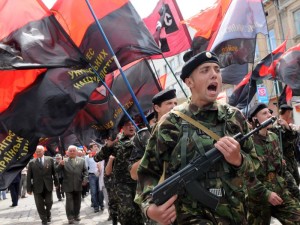nsnbc : A Moscow court convicted Natalya Sharina, the 59-year-old director of the State Library of Ukrainian Litterature, Natalya Sharina after a 19-months-long ordeal for allegedly inciting hatred and distributing extremist materials. Sharina maintains her innocence, claims among others planted evidence and stressed her innocence.
 Sharina testified in a dozen of hearing over the past 19 month “I don’t understand which of my daily actions as a library director constituted a crime.” Proceedings against her began in November 2016 when the prosecution claimed the library housed “extremist books” including “A War in a Crowd”, written by Ukrainian nationalist politician Dmitro Korchinsky. The prosecution claimed Sharina was personally responsible because she herself, the library’s director, put the covered books on the shelves.
Sharina testified in a dozen of hearing over the past 19 month “I don’t understand which of my daily actions as a library director constituted a crime.” Proceedings against her began in November 2016 when the prosecution claimed the library housed “extremist books” including “A War in a Crowd”, written by Ukrainian nationalist politician Dmitro Korchinsky. The prosecution claimed Sharina was personally responsible because she herself, the library’s director, put the covered books on the shelves.
Sharina and the defense argued that she could not be held responsible. She testified “That was never part of my job. … I never worked with books or readers directly.” However, the prosecution and judge was unimpressed. On June 5, she was found guilty and handed a four-year suspended sentence. She commented:
“I am shaken to the core by this whole situation. … It is so surreal—to be convicted only because I am the director of the Library of Ukrainian Literature!”
The trial was highly controversial, not only because it underpins that freedom of speech and expression are under extreme threat in Russia. The trial also was – and remains – controversial because it is widely perceived as a political trial aimed to silence any and all who could possibly voice dissent about Russia’s role in Ukraine, Crimea, and the so-called Donbas Republics of Ukraine. The trial has also been described as extreme witch-hunt, reminiscent of “the good old Soviet days”.
One of the questions the trail nor the verdict clarified was what exactly Sharina had done wrong that constituted a crime or where the “extremist materials” had come from.
The state’s case against Sharina went ahead even as crucial questions remained unanswered. What exactly had the director done that constituted a crime? Where had the extremist materials come from? Police first searched the library and opened their first extremism case against her seven years ago. Police found Korchinsky’s “A War in the Crowd,” in 2010, not during a raid in October 2015, Sharina testified in court.
During her trial she tacitly suggested the possibility that evidence had been planted when she said “We didn’t have (that book) in (then in October 2015). So we were surprised that this same book was seized in 2015, too”. The defense also expressed surprise at seeing an unfamiliar edition of “A War in the Crowd,” offered as evidence during proceedings this year. Sharina’s lawyer, Ivan Pavlov said, not only was it a different edition from the copy allegedly seized in 2015, it had no library stamps.
The prosecution also submitted CDs of songs of the Ukrainian National Assembly, Ukrainian People’s Self-Defence, an organization banned in Russia too. These were also supposedly found in the raid in 2015. According to Sharina, they could not have been stored at the library. The organization is known for links to NATO stay behind networks, but literature and other information about does, undeniably, belong to an accurate and full representation of Ukraine, its history, politics and culture.
But the “evidence” about the UNA-UNSO may have been planted. Pavlov says he is convinced evidence was planted during the raid. “We had witnesses—people who were present during the raid—testifying that they saw these materials being planted” he told reporters.
As unbelievable as it may sound, and as it often is in politicized show trials, for Natalya Sharina—who for nearly two years was confined to her apartment, unable to visit family, make phone calls or leave for more than two hours a day—a four-year suspended sentence is probably the easiest or the only way out.
CH/L – nsnbc 08.06.2017
Source Article from https://nsnbc.me/2017/06/08/russian-court-convicts-extremist-director-of-ukrainian-library-in-moscow/
Related posts:
Views: 0
 RSS Feed
RSS Feed

















 June 9th, 2017
June 9th, 2017  Awake Goy
Awake Goy 











 Posted in
Posted in  Tags:
Tags: 
















